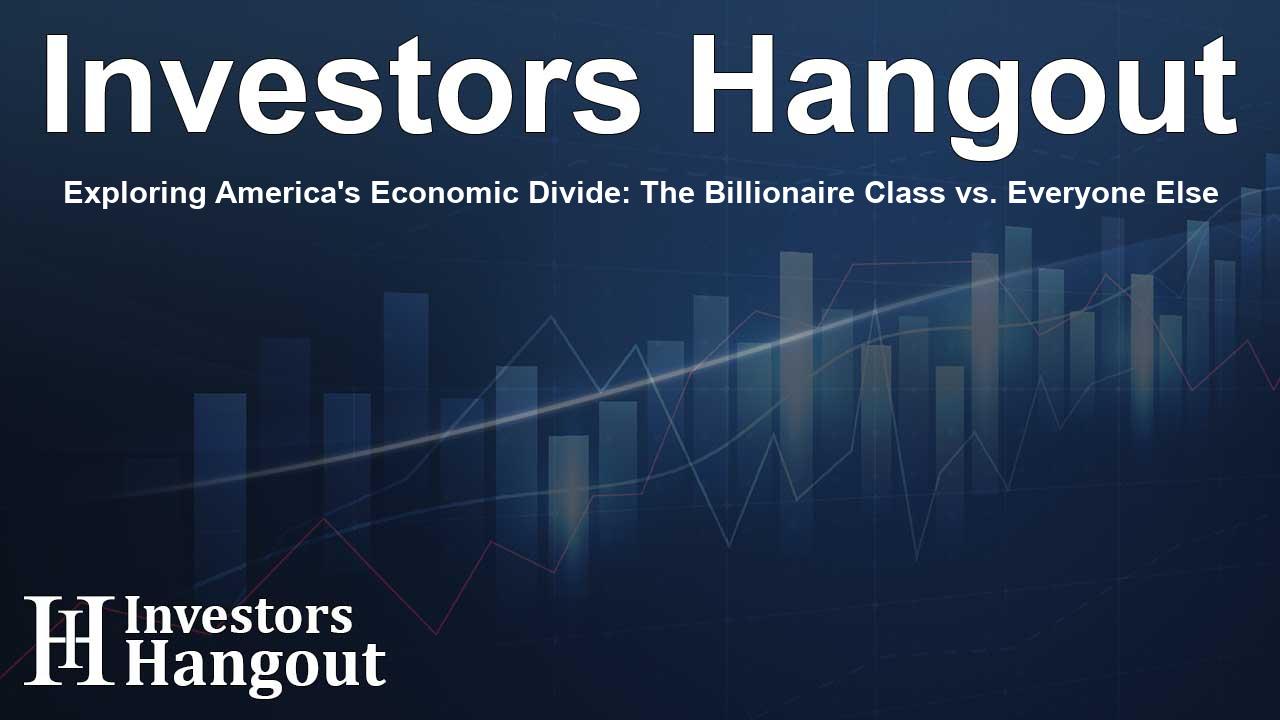Exploring America's Economic Divide: The Billionaire Class vs. Everyone Else

Unraveling Economic Inequality in America
Recent discussions led by Sen. Bernie Sanders shed light on the increasing economic disparity in the U.S. He articulates a powerful message: the nation is witnessing the emergence of two distinct Americas. One America caters to the billionaire class, while the other struggles to get by, making it clear that the system is not just in disrepair but on the verge of collapse for most working-class individuals.
The Disparity Between Wealthy and Working-Class
Sanders vividly explains, "What we are witnessing is the rise of two Americas. One for the billionaire class and one for everybody else." This statement captures the essence of his opinion piece, where he critiques the corporate-run political and media sectors. He believes they largely ignore the escalating financial crises faced by the average American.
In this widening wealth gap, prominent billionaires like Elon Musk, Jeff Bezos, Mark Zuckerberg, and Larry Ellison have seen their fortunes swell substantially. For instance, Musk's wealth has soared by over $180 billion since presidential election day, which raises concerns among many about the alarming reality where his wealth exceeds that of 52% of American households combined.
Worker Struggles Amid Profiting Executives
Meanwhile, everyday Americans face mounting challenges in affording basic necessities such as rent, healthcare, groceries, and childcare. Despite substantial increases in productivity among workers, Sanders notes that real weekly wages have not kept pace; they're actually lower today than they were over half a century ago.
Executive Compensation: A Stark Comparison
A recent report from the Institute for Policy Studies highlights that CEOs at the 100 largest low-wage companies earned, on average, 632 times more than their typical employees in 2024. For example, Starbucks CEO Brian Niccol received an astounding salary of $95.8 million, while the average employee earned only $14,674—a striking ratio of 6,666 to 1.
As per the same report, Carrier Global CEO David Gitlin earned $65.7 million, juxtaposed against an average worker salary of $51,001. In another example, Coca-Cola's James Quincey received $28 million while his employees made just $14,144.
Stock Buybacks vs. Workforce Investment
The IPS report reveals that these leading companies have allocated $644 billion for stock buybacks from 2019 to 2024, benefiting executives and shareholders significantly but failing to provide any substantial relief for workers. Shockingly, more than half of these companies spent more on buybacks than on investments in their own workforce.
Lowe’s, for example, dedicated $46.6 billion to stock buybacks during this span, which could have translated into annual bonuses of $28,456 for each of its 273,000 employees. Instead, CEO Marvin Ellison made $20.2 million last year, reinforcing the vast chasm between executive pay and employee compensation.
Advocating for Systemic Changes
In light of these unsettling statistics, the report suggests several policy reforms. It calls for increasing the tax on stock buybacks from 1% to 4% and imposing taxes on extreme CEO-worker compensation disparities. Furthermore, it recommends placing restrictions on federal contracts for companies that offer disproportionately high executive pay.
Citing former Supreme Court Justice Louis Brandeis, Sanders warned, "We can have democracy in this country or we can have great wealth concentrated in the hands of the few, but we cannot have both." He encourages the American populace to rise above divisions and strive for substantive reform.
Sanders concludes, expressing the urgency for collective action. He emphasizes that if Americans can resist being divided by political distractions and corporate interests, there’s a real chance to change pathways towards greater economic equality.
Frequently Asked Questions
What is the main message of Bernie Sanders' statement?
Sanders highlights the growing economic divide in America, emphasizing that it has created two distinct classes: the ultra-wealthy and the struggling majority.
How much wealth has Elon Musk gained since the last presidential election?
Elon Musk's wealth has increased by over $180 billion since the day of the last presidential election.
How do CEO salaries compare to their workers' wages?
CEOs at large corporations often earn hundreds of times more than their median employees, with ratios sometimes exceeding 6,000 to 1.
What solution does Sanders propose to combat economic inequality?
He advocates for increasing taxes on stock buybacks and addressing extreme disparities in CEO-worker compensation.
What impact do stock buybacks have on employees?
Stock buybacks primarily benefit executives and shareholders, often at the expense of investing in employee wages or benefits.
About The Author
Contact Riley Hayes privately here. Or send an email with ATTN: Riley Hayes as the subject to contact@investorshangout.com.
About Investors Hangout
Investors Hangout is a leading online stock forum for financial discussion and learning, offering a wide range of free tools and resources. It draws in traders of all levels, who exchange market knowledge, investigate trading tactics, and keep an eye on industry developments in real time. Featuring financial articles, stock message boards, quotes, charts, company profiles, and live news updates. Through cooperative learning and a wealth of informational resources, it helps users from novices creating their first portfolios to experts honing their techniques. Join Investors Hangout today: https://investorshangout.com/
The content of this article is based on factual, publicly available information and does not represent legal, financial, or investment advice. Investors Hangout does not offer financial advice, and the author is not a licensed financial advisor. Consult a qualified advisor before making any financial or investment decisions based on this article. This article should not be considered advice to purchase, sell, or hold any securities or other investments. If any of the material provided here is inaccurate, please contact us for corrections.
